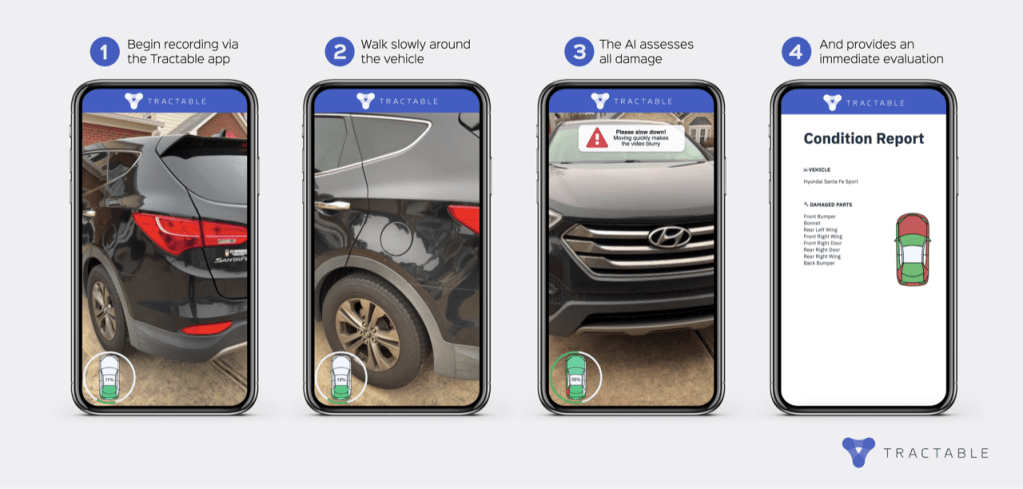As the insurance industry adjusts to life in the 21st century (heh), an AI startup that has built computer vision tools to enable remote damage appraisals is announcing a significant round of growth funding.
Tractable, which works with automotive insurance companies to let users take and submit photos of damaged cars that are then “read” to make appraisals, has raised $60 million, a Series D that values Tractable at $1 billion, the company said.
Tractable says it works with more than 20 of the top 100 auto insurers in the world, and it has seen sales grow 600% in the last 24 months, which CEO Alex Dalyac told me translates as “well into eight figures of annual revenue.” He also told me that “we would have grown even faster if it weren’t for COVID.” People staying at home meant far fewer people on the roads, and fewer accidents.
Its business today is based mostly around car accident recovery — where users can take pictures using ordinary smartphone cameras, uploading pictures via a mobile web site (not typically an app).
But Tractable’s plan is to use some of the funding to expand deeper into areas adjacent to that: natural disaster recovery (specifically for appraising property damage), and used car appraisals. It will also use the investment to continue building out its technology, specifically to help build out better, AI-based techniques of processing and parsing pictures that are taken on smartphones — by their nature small in size.
Insight Partners and Georgian Partners co-led the round and it brings the total raised by the company to $115 million.
Dalyac, a deep learning researcher by training who co-founded the company with Razvan Ranca and Adrien Cohen, said that the “opportunity” (if you could call an accident that) Tractable has identified and built to fix is that it’s generally time-consuming and stressful to deal with an insurance company when you are also coping with a problem with your car.
And while a new generation of “insurtech” startups have emerged in recent years that are bringing more modern processes into the equation, typically the incumbent major insurance companies — the ones that Tractable targets — have lacked the technology to improve that process.
It’s not unlike the tension between fintech-fuelled neobanks and the incumbent banks, which are now scrambling to invest in more technology to catch up with the times.
“Getting into an accident can be anything from a hassle to trauma,” Dalyac said. “It can be devastating, and then the process for recovery is pretty damn slow. You’re dealing with so many touch points with your insurance, so many people that need to come and check things out again. It’s hard to keep track and know when things will truly be back to normal. Our belief is that that whole process can be 10 times faster, thanks to the breakthroughs in image classification.”
That process currently also extends not just to taking pictures for claims, but also to help figure out when a car is beyond repair, in which case which parts can be recycled and reused elsewhere, also using Tractable’s computer vision technology. Dalyac noted that this was a popular enough service in the last year that the company helped recycle as many cars “as Tesla sold in 2019.”
Customers that have integrated with Tractable to date include Geico in the U.S., as well as a large swathe of insurers in Japan, specifically Tokio Marine Nichido, Mitsui Sumitomo, Aioi Nissay Dowa and Sompo. Covéa, the largest auto insurer in France, is also a customer, as is Admiral Seguros, the Spanish entity of U.K.’s Admiral Group, as well as Ageas, a top U.K. insurer.
Japan is the company’s biggest market today Dalyac said — the reason being that it has an aging population, but one that is also very strong on mobile usage: combining those two, “automation is more than a value add; it’s a must have,” Dalyac said. He also added that he thinks the U.S. will overtake Japan as Tractable’s biggest market soon.
The new directions into property and other car applications will also open the door to a wider set of use cases beyond working with insurance providers over time. It will also bring Tractable potentially into new competitive environments. There are other companies that have also identified this opportunity.
For example, Hover, which has built a way to create 3D imagery of homes using ordinary smartphone cameras, is also eyeing ways of selling its tech (originally developed to help make estimates on home repairs) to insurance companies.
For now, however, it sounds like the opportunity is a big enough one that the race is more to meet demand than it is to beat competitors to do so.
Hover secures $60M for 3D imaging to assess and fix properties
“Tractable’s accelerating growth at scale is a testament to the power and differentiation of their applied machine learning system, which continues to improve as more businesses adopt it,” said Lonne Jaffe, MD at Insight Partners and Tractable board member, in a statement. “We’re excited to double down on our partnership with Tractable as they work to help the world recover faster from accidents and disasters that affect hundreds of millions of lives.”
Emily Walsh, partner at Georgian Partners added: “Tractable’s industry-leading computer vision capabilities are continuing to fuel incredible customer ROI and growth for the firm. We’re excited to continue to partner with Tractable as they apply their artificial intelligence capabilities to new, multi-billion dollar market opportunities in the used vehicle and natural disaster recovery industries.”































Comment